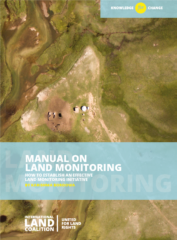
Monitoring, map-making and related activities are undertaken on a number of land related issues by a diversity of expert Coalition members, from inter-governmental organisations, public institutions and research institutes to civil society organisations
and indigenous people’s movements. They serve various purposes such as assessing the performance of the government, monitoring the organisation’s own programmes and projects, or recording evidence to be used for advocacy. The value of monitoring can thereby be seen as it records dynamic change providing relevant and timely inputs to various land related policy processes and decision-making bodies.
ILC members at the local levels have seen the value that data gathered from monitoring can have and have similarly expressed their interest in undertaking such activities in national engagement strategies, or regional monitoring activities during annual workplan sessions in the ILC Regional Assemblies, held respectively in Asia, Latin America and Africa.
This guide, titled ILC’s Manual on Land Monitoring, is a first step for Coalition members to determine if monitoring is actually a viable activity that can be undertaken by their organisation. Choosing to undertake monitoring is dependent on considerations such as evaluating the sufficiency of resources, capacity to design a sound monitoring system, and availability of political indows to effect change, amongst others. It may be that other strategies such as academic research, or providing inputs to media, or even making a film about a particular situation may be more doable and ultimately, effective in targeting positive pro-poor land policy changes than necessarily adopting a monitoring activity.

Rejoignez-nous sur
LinkedIn